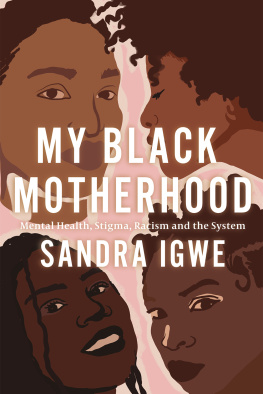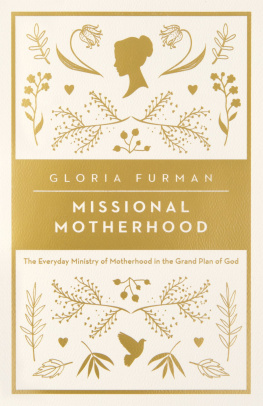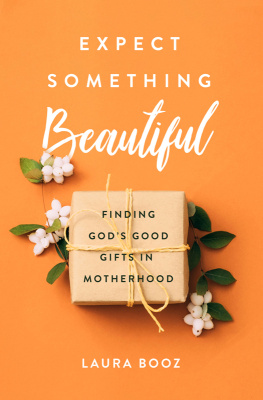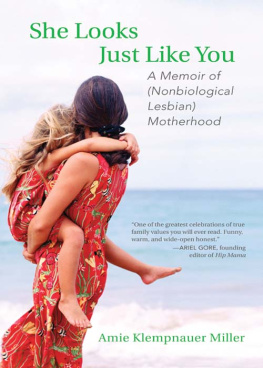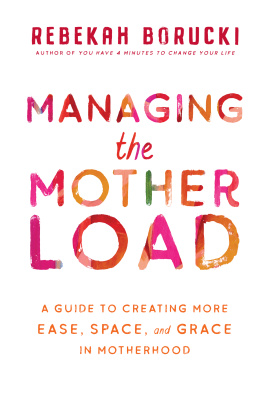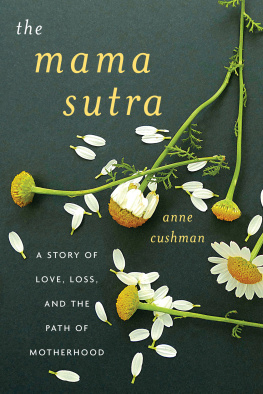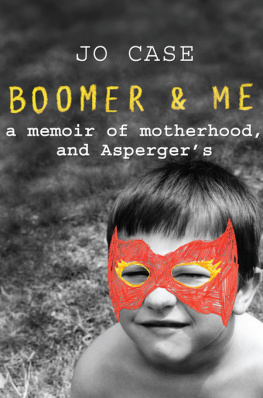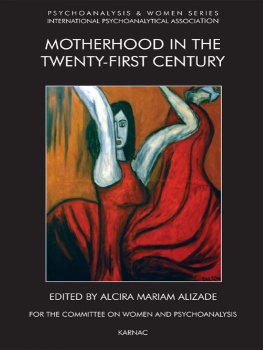Motherhood
A Confession
NATALIE CARNES
STANFORD UNIVERSITY PRESS
Stanford, California
STANFORD UNIVERSITY PRESS
Stanford, California
2020 by the Board of Trustees of the Leland Stanford Junior University.
All rights reserved.
No part of this book may be reproduced or transmitted in any form or by any means, electronic or mechanical, including photocopying and recording, or in any information storage or retrieval system without the prior written permission of Stanford University Press.
Printed in the United States of America on acid-free, archival-quality paper
LIBRARY OF CONGRESS CATALOGING-IN-PUBLICATION DATA
Names: Carnes, Natalie, author.
Title: Motherhood : a confession / Natalie Carnes.
Description: Stanford, California : Stanford University Press, 2020. | Includes bibliographical references.
Identifiers: LCCN 2019037471 (print) | LCCN 2019037472 (ebook) | ISBN 9781503608313 (cloth) | ISBN 9781503612310 (epub)
Subjects: LCSH: MotherhoodReligious aspectsChristianity.
Classification: LCC BV4529.18 .C376 2020 (print) | LCC BV4529.18 (ebook) | DDC 248.8/431dc23
LC record available at https://lccn.loc.gov/2019037471
LC ebook record available at https://lccn.loc.gov/2019037472
Cover design: David Drummond
Text design: Kevin Barrett Kane
This book is typeset in Adobe Caslon Pro, designed by Carol Twombly in 1990, based on William Caslons specimen pages printed between 17341770
For Chora, Edith, and Simone
CONTENTS
PREFACE
Reborn
Some women long for motherhood. Yearning for a child, they receive news of their pregnancy with elation. It is to them glad tidings of great joy. I was untouched by that desire when I began to suspect, with dim horror, that I might be pregnant. Alone in our bathroom, I confirmed my suspicion, and wept. For several days, my bewildered husband consoled me before asking gently, tentatively, when I might be ready to celebrate our news. Not yet.
How could I celebrate? I had no room for a child. I was not halfway through my doctoral program. I was negotiating a new marriage. I had no real income. What I had were anxieties and ambitions so bloated they seemed to crowd out any space for new life. How could I teach my first classes, finish my degree, and land an academic job with a baby? Somewhere I had latched on to the notion that people raise children after their own journey of development reached some kind of conclusion, or at least a plateau, and I felt far from any arrival. Even so, pregnancy was upon me, falling invisibly and heavily on my body.
Nausea deflated my angst and sustained me. For months, I lived in a fog of sickness. When it lifted, I saw that a powerful love for my daughter had already taken shape. That love and nausea together carried me to the final hours of my pregnancy, when I found myself huddled in a tub, racked by contractions. Everything in those moments was stripped awaymy labor strategies, my contraction mantras, my images, my plans, my clothes. The pain and urgency of labor left me exposed. Perhaps for the only time since my childhood, I was naked and unashamed. There was a final burst of pain and effort, and my daughter arrived.
As clearly as I remember my daughters birth, I can summon no memory, however faint or blurred, of my own. But who can? As a conscious memory, my birth is lost to me, even though it is my very beginning, even as it stays somewhere in my bodily memory, shaping my relation to the world. My infancy is long dead, Augustine writes, and yet I am alive.
The loss and ongoing presence of our births is mirrored in the narrative of Jesus in the Gospel of John. There is no infancy narrative in that gospel, no angelic announcement of birth, no donkey-riding Mary great with child, no magi seeking the babe, no boy growing in wisdom and stature. Johns book opens with Word and Light present in the beginning. When Jesus appears, he is an adult; when his mother enters the stage, she provokes his first miracle and signals that his ministry is underway. There is no story of physical birthbut neither is birth absent from the gospel. As our own births mark us in mysterious and implicit ways, so birth remains both unnarrated in the Gospel of John and also ever-present, pervading it in metaphors and images.
The first mention of birth in Johns Gospel comes from Jesuss conversation with Nicodemus. Truly, truly, I say to you, no one can see the kingdom of God unless she is born again. Today, rebirth is so common a way of naming conversion that it has become stale and obvious. But to Nicodemus, Jesuss words are nonsense. How can anyone be born when he is old? Shall I crawl back into my mothers womb? Patiently, Jesus distinguishes earthly from heavenly and physical from spiritual. He redirects Nicodemus to a different womb, implying a different parent, and arriving, finally, at a second subtle meditation on parenthood, in which God lovingly sends Gods only-begotten Son to give life to the world.
Bookending Jesuss conversation with Nicodemus are two encounters with John the Baptist, who baptizes Jesus prior to the conversation and testifies about him after. In the episode following his reunion with John, Jesus, too, begins baptizingor at least his disciples do. Language of birth abounds in these first few chapters: the rebirth metaphors for conversion, the descriptions of Jesus as the only-begotten Son of God, the baptisms of and by Jesus. Images of wombs and mothers and waters of parturition seep into the book, enlivening descriptions of conversion and new life. Birth, as metaphor and image, is everywhere. The early church dramatized the birth imagery of baptism by requiring the baptized to enter the waters naked, dipping their entire body into a font shaped like a womb or a coffin, as the baptized died to their old life and were reborn in the womb of God, the new mother of their new childhood.
Yet we dont always see how motherhood, infancy, and children disclose what it means to be human in relation to the divine. For centuries, Christian texts exploring humanness have come from men reflecting on their own flesh. Generation after generation of Christians has spoken of God with masculine pronouns and titles that have ossified into literal referents. Women and children have remained largely absent from talk of divinity and humanity. But what if their lives were taken as significant sites for theological work? What if their bodies were seen as revelatory of human life as it encounters and fails to encounter divine presence? What if the most influential reflection on humanity in the Western world centered not on the struggles of a mans body but on those of a womans or a childs? How might a womans or childs Confessions go?
I dont remember the first time I encountered Augustines Confessions, but I remember the first time its pathos sank into my imagination. I was studying for my masters degree in theology, and Augustines story of desireits betrayals and its transformationsgripped me. In the midst of a tumultuous breakup, I was struck by one episode in particular: the conclusion of Augustines faithful relationship with his common-law wife of over ten years, whose social status deemed her unfit to be his legitimate wife. Augustine describes this woman as ripped from his side, leaving his heart wounded, torn, and trailing blood. She vows ongoing, separated faithfulness to him as she leaves both Augustine and their son, named Adeodatus or gift of God, to return to Africa. We know what happened to Augustine. What happened to this woman, whom he loved so ardently for a time? She never appears again in the story. How would she have narrated their relationship and its end? Was her heart restless? Did it find rest?
Twice in the next few years I taught the
Next page

